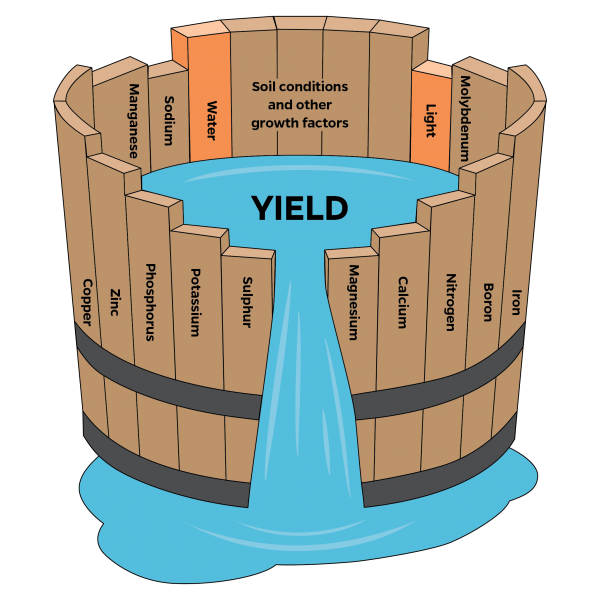Liebig’s Law of Minimum

Definition
In the 19th century, the German scientist Justus von Liebig formulated the “Law of the Minimum,” which states that if one of the essential plant nutrients is deficient, plant growth will be poor even when all other essential nutrients are abundant.
How It Works
It states that growth is controlled not by the total originality applied to plant growth, where it was found that increasing the amount of plentiful nutrients did not increase plant growth. Only by increasing the amount of the limiting nutrient (the most scarce) in relation to “need”, was the growth of the plant improved.
Importance of Micronutrients
The Law of the Minimum takes on added importance when fertilizer prices — especially of nitrogen (N) and phosphate (P2O5) products — are high. This may tempt some growers to reduce or even eliminate applications of micronutrient or secondary nutrient fertilizers that provide balanced potassium (K), magnesium (Mg) and sulfur (S). But von Liebig’s “Law” tells us clearly that if a soil is deficient in, say, Mg, yields will be depressed regardless of how much N-P-K product you apply.

For More Information
For more information or to purchase a product, please contact:
Oklahoma, Texas panhandle & Kansas
Chris Shetley
Sales Representative
(405) 366-9500 (Office)
(405) 222-8599 (Cell)
Chris.Shetley@Arcosa.com
Washington, Oregon, Nevada, California and surrounding area
Tim Stanfield
National Sales Manager
479-236-9575
Tim.Stanfield@arcosa.com
Prilled Products for Agricultural Applications
Jim Madsen
Marketing Director
(405) 366-9587 (Office)
Jim.Madsen@Arcosa.com
Calcium is a vital constituent of cell walls in stems, roots and leaves.